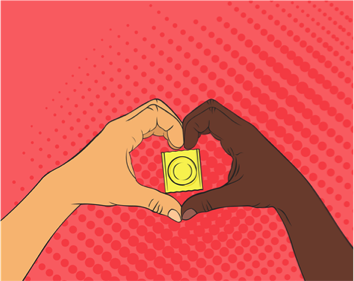
What is non-specific urethritis?
Non-specific urethritis (NSU) is the term used to describe inflammation of a man’s urethra (the tube that carries wee from the bladder to the outside) that is not caused by gonorrhoea or chlamydia. It may be caused by one of a number of other infections.
The infection can easily be caught through vaginal sex. It can also be acquired through anal or oral sex, although this is less common. NSU can sometimes occur without being sexually transmitted and is the most common condition diagnosed and treated among men in Sexual Health Clinics in the UK.

What are the symptoms (signs) of non-specific urethritis?
Non-specific urethritis (NSU) can cause different symptoms in men and women. In some cases, NSU doesn’t cause any symptoms at all.
Symptoms of non-specific urethritis in men
Symptoms can include:
- a white or cloudy discharge from the tip of the penis
- a burning or painful sensation when you pee
- the tip of your penis feeling irritated and sore
Symptoms may begin a few weeks or several months after an infection.
Symptoms of non-specific urethritis in women
NSU is a condition in men that may not cause symptoms in women. However, the infections that cause NSU in men can spread to other parts of the female reproductive system – for example, the womb or fallopian tubes.
If the infection does spread, there is a danger that a woman may develop pelvic inflammatory disease (PID) which can cause pain and infertility.

Treatment for non-specific urethritis
Non-specific urethritis (NSU) is usually treated with a short course of antibiotics to kill the bacteria that caused the infection. You won’t usually need to return to the clinic as long as you’ve completed the course of antibiotics and taken precautions not to get re-infected.

What should I do if I think I have non-specific urethritis?
If you think that you might have urethritis, or you have had unprotected sex with someone who has NSU then you need to book an appointment at one of our Devon Sexual Health clinics . A specially trained doctor or nurse will chat with you about your sexual history and will also take some tests, these might include a swab test where a sample of fluid is taken with a cotton bud or a plastic loop and you will also be asked to give a urine test. It’s best not to urinate for an hour before coming to the clinic as this will make the test more accurate.
You will also be offered tests for other sexually transmitted infections (STIs) because urethritis can often be caused by chlamydia.

How can I avoid getting non-specific urethritis?
Non – specific urethritis is more common among people who are at risk of STIs. This includes people who are sexually active, have had unprotected sex or have a new sexual partner whose sexual history they are not aware of. You can avoid getting non-specific urethritis by wearing condom during vaginal, anal or oral sex and by asking your partner about their sexual history. You may also wish to consider getting tested for common STIs at the start or end of a relationship.
Occasionally, non-specific urethritis can be caused by irritation from deodorant or soap, vigorous sex or masturbation, or damage to the urethra by inserting an object such as a catheter into it. Treatment is still the same.

